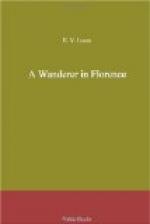And in some minor matters (may I say it?)
Could wish him rather sager. But from thee
God hold back wisdom yet for many years!
Whether in early season or in late
It always comes high-priced. For thy pure breast
I have no lesson; it for me has many.
Come throw it open then! What sports, what cares
(Since there are none too young for these) engage
Thy busy thoughts? Are you again at work,
Walter and you, with those sly labourers,
Geppo, Giovanni, Cecco, and Poeta,
To build more solidly your broken dam
Among the poplars, whence the nightingale
Inquisitively watch’d you all day long?
I was not of your council in the scheme,
Or might have saved you silver without end,
And sighs too without number. Art thou gone
Below the mulberry, where that cold pool
Urged to devise a warmer, and more fit
For mighty swimmers, swimming three abreast?
Or art though panting in this summer noon
Upon the lowest step before the hall,
Drawing a slice of watermelon, long
As Cupid’s bow, athwart thy wetted lips
(Like one who plays Pan’s pipe), and letting drop
The sable seeds from all their separate cells,
And leaving bays profound and rocks abrupt,
Redder than coral round Calypso’s cave?
In 1853 Landor put forth what he thought his last book, under the title “Last Fruit off an Old Tree”. Unhappily it was not his last, for in 1858 he issued yet one more, “Dry Sticks faggotted by W. S. Landor,” in which was a malicious copy of verses reflecting upon a lady. He was sued for libel, lost the case with heavy damages, and once more and for the last time left England for Florence. He was now eighty-three. At first he went to the Villa Gherardesco, then the home of his son Arnold, but his outbursts were unbearable, and three times he broke away, to be three times brought back. In July, 1859, he made a fourth escape, and then escaped altogether, for Browning took the matter in hand and established him, after a period in Siena, in lodgings in the Via Nunziatina. From this time till his death in 1864 Landor may be said at last to have been at rest. He had found safe anchorage and never left it. Many friends came to see him, chief among them Browning, who was at once his adviser, his admirer and his shrewd observer. Landor, always devoted to pictures, but without much judgment, now added to his collection; Browning in one of his letters to Forster tells how he has found him “particularly delighted by the acquisition of three execrable daubs by Domenichino and Gaspar Poussin most benevolently battered by time”. Another friend says that he had a habit of attributing all his doubtful pictures to Corregoio. “He cannot,” Browning continues, “in the least understand that he is at all wrong, or injudicious, or unfortunate in anything.... Whatever he may profess, the thing he really loves is a pretty girl to talk nonsense with.”




